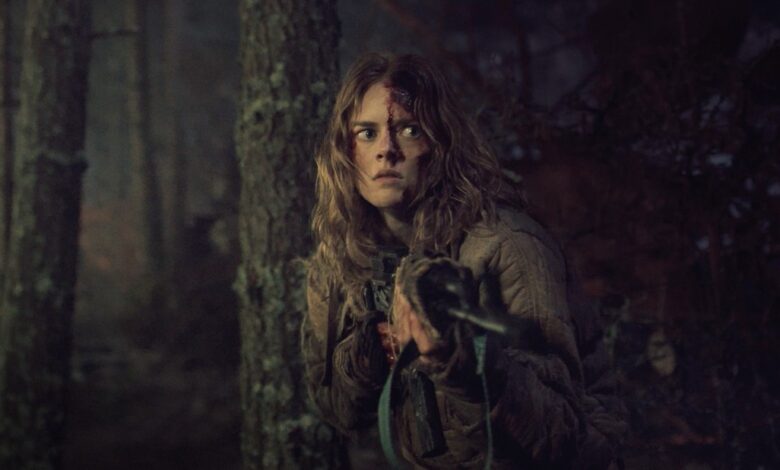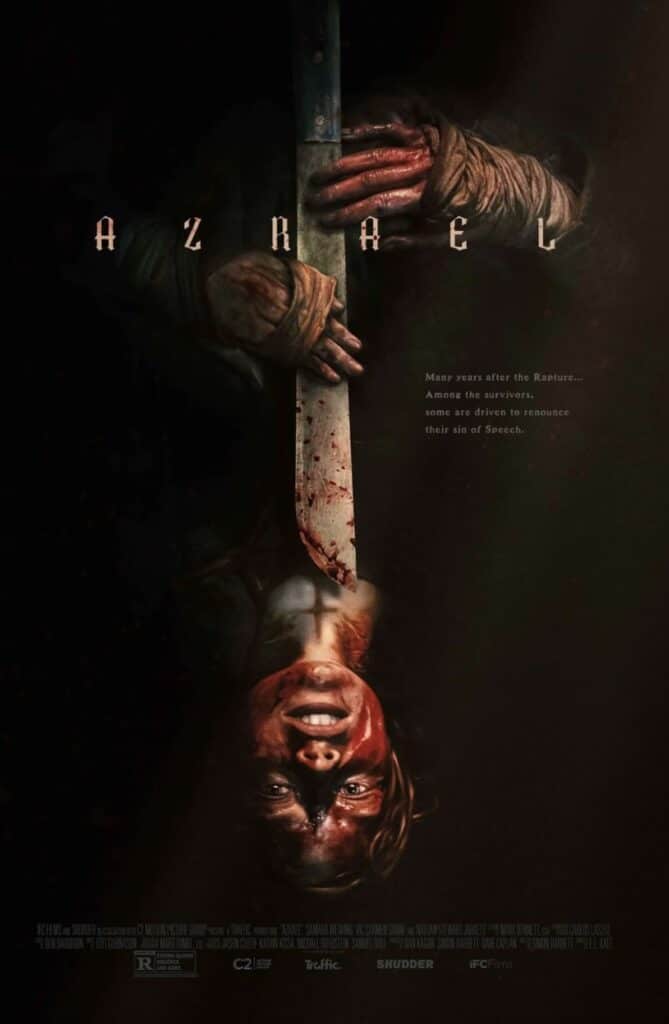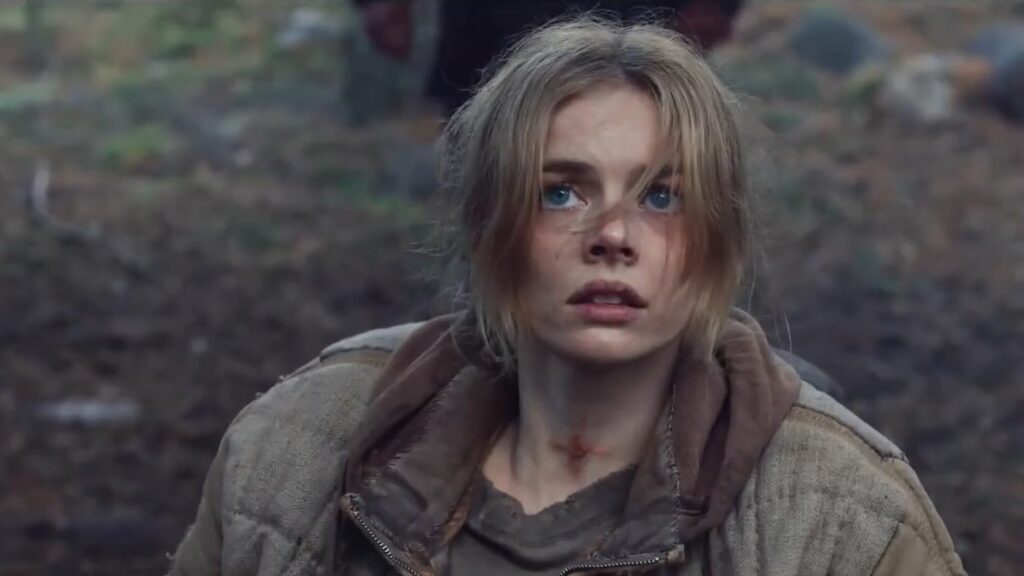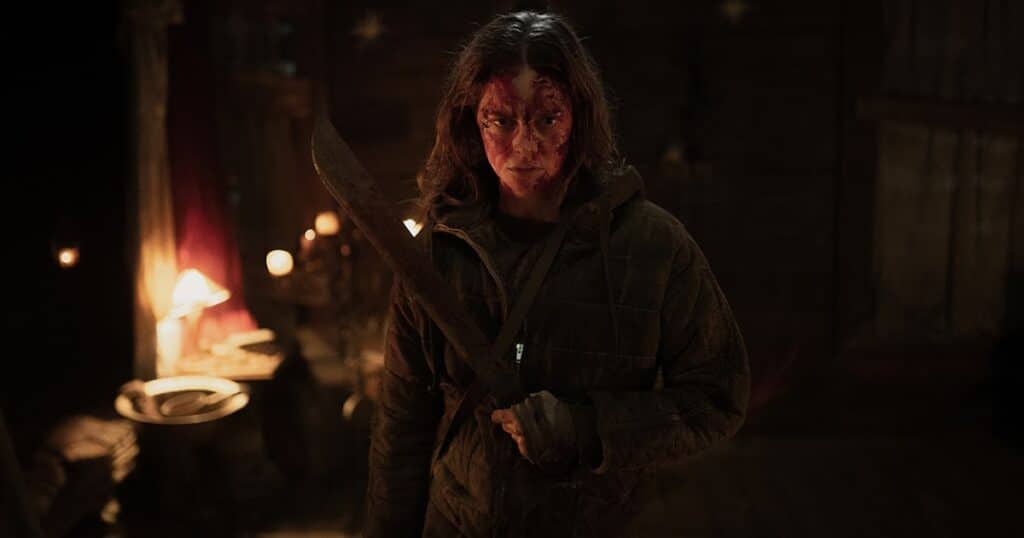
Azrael dares to strip back horror to its essentials, serving up a relentless, mostly wordless thriller that’s sure to polarize audiences. Centered around Samara Weaving as Azrael, a lone survivor navigating a barren, post-apocalyptic world, this film trades in conventional dialogue for pure, primal storytelling. Weaving, with a horror resume that includes Ready or Not, The Babysitter, and Scream 6, shines in a role that demands full physicality, conveying terror, rage, and resilience without words. Her presence elevates the character, guiding us through her bloody and visceral transformation from survivor to avenger in a landscape that’s as intriguing as it is unsettling.

The film’s story unfolds within an ambiguous, oppressive society that has chosen to renounce speech in the wake of a rapture-like event. Communication is reduced to gestures and expressions as speech is deemed sinful, an idea that the filmmakers cleverly explore without the need for heavy exposition. Instead of spelling everything out, the film leans on environmental clues and religious undertones that feel just tangible enough to immerse us while leaving plenty to interpret. Set in a world of wendigo-like creatures—pale, sinewy, and ravenous—the horror escalates as Azrael is forced to reckon with both human foes and these otherworldly monsters. These monsters could have been more fleshed out, but they still manage to leave a chilling mark, particularly as they reflect the desperation and bleakness of this lawless society.
Azrael takes bold narrative risks with its dialogue-free approach, but these choices occasionally hinder the film’s pacing and clarity. At times, the story moves in fits and starts, with scenes that feel more like standalone moments rather than a seamless journey. Azrael’s motivations, especially during her frequent escapes and returns, remain somewhat elusive, making it difficult for viewers to fully understand her end goal. Certain sequences linger just a bit too long, creating a sense of repetitiveness, while the absence of dialogue means that key plot points are sometimes obscured, leaving questions unanswered. Though the intention might be to build suspense, these gaps can disrupt the story’s flow, causing viewers to occasionally feel lost or distanced from Azrael’s journey. Ultimately, the pacing is uneven but balanced by compelling visuals and atmosphere that keep the story engaging even when clarity wavers.

The screenplay by Simon Barrett (You’re Next) and direction by Evan Katz keep things taut and focused, delivering a lean narrative with a minimalist approach. There’s no room here for sympathy toward side characters; everyone Azrael meets feels like a mere obstacle in her journey. The absence of dialogue not only creates tension but also highlights the isolation and savagery of this mute society. Yet, there are moments where the lack of speech creates a frustrating distance. Some scenes feel murky and ambiguous, leaving character motivations underdeveloped, especially when it comes to Azrael’s companion, Kenan (Nathan Stewart-Jarrett). He seems pivotal in her story, yet without verbal exchanges, his importance to Azrael remains unclear, a curious choice that might leave viewers wanting more depth.
Visually, Azrael is a throwback to gritty, 1970s grindhouse horror, invoking bleak religious themes with quotes emblazoned in red throughout. The color-drained cinematography mirrors the harshness of a world emptied of joy or hope. The action sequences—while competently shot—often lack a real sense of peril, reducing suspense in places. The script sometimes betrays its minimalistic intent, as Azrael escapes and returns in a repetitive cycle that strains credibility, even within the film’s internal logic. However, it’s Weaving’s raw, physical performance and the overall aesthetic that carry Azrael through its thin patches, allowing it to land as a memorable, if flawed, horror experience.

Ultimately, Azrael won’t be everyone’s cup of tea. It’s a bold, silent experiment in an age of verbose horror, delivering a distinct and eerie atmosphere that makes up for its narrative limitations. For those willing to embrace its quieter terror, Azrael offers a haunting journey into a twisted world that, while uneven, still leaves a powerful impression.

3.5/5 Stars






